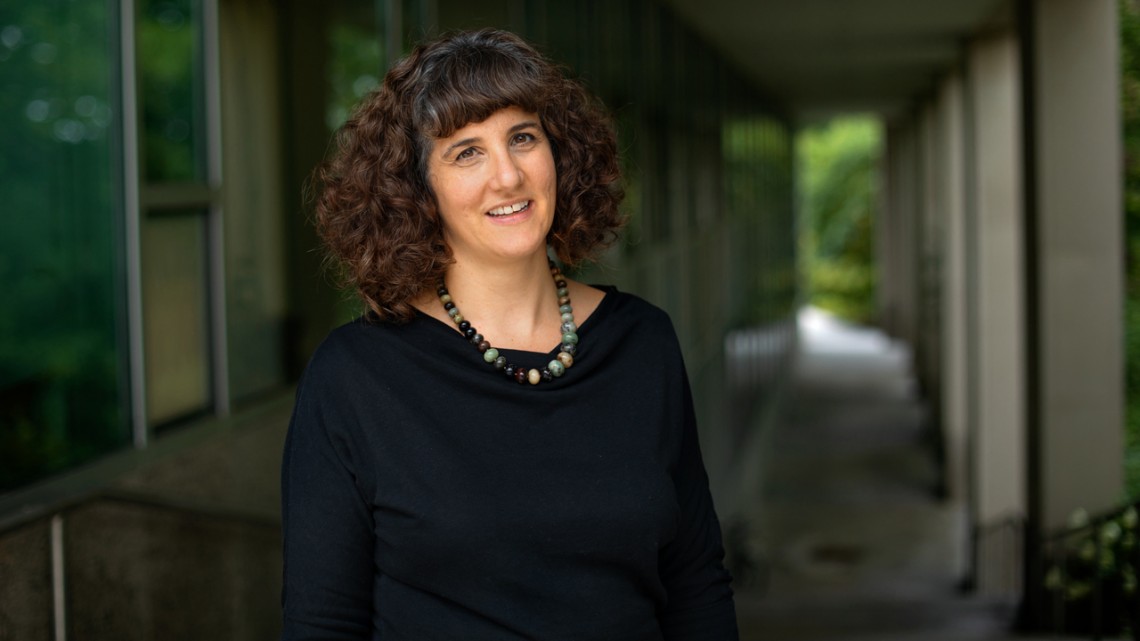
Hale Ann Tufan, adjunct assistant professor in the College of Agriculture and Life Sciences and co-director of Gender-responsive Researchers Equipped for Agricultural Transformation.
Gender-equality champion wins Borlaug award for ag research
By Matt Hayes
Hale Ann Tufan, a leading advocate for gender equality as a central tenet of crop improvement, has won the 2019 Norman E. Borlaug Award for Field Research and Application.
The award, given by the World Food Prize, is the premier recognition for agricultural scientists younger than 40.
Tufan, co-director of Gender-responsive Researchers Equipped for Agricultural Transformation (GREAT) and adjunct assistant professor in the College of Agriculture and Life Sciences (CALS), was recognized for championing gender-supportive activities within the global agricultural research community. Her advocacy across disciplines has shifted crop improvement and agriculture research to include all people and genders.
“To effectively confront global hunger, all voices must be heard and valued, regardless of gender, age, race, ethnicity and ability,” said Tufan. “Norman Borlaug believed in the power of human ingenuity to solve our greatest challenges, and his dedication reshaped the world. I am humbled to receive this award named in his honor.”
She will receive the award Oct. 16 at a ceremony in Des Moines, Iowa.
By drawing attention to how gender issues can impact crop breeding, Tufan’s work is benefiting men and women farmers and making communities healthier and more productive. The GREAT project, funded by the Bill & Melinda Gates Foundation, increases opportunities for equitable participation and the sharing of benefits from agricultural research, and improves outcomes for smallholder female farmers, entrepreneurs and farmer organizations across sub-Saharan Africa. Researchers from 18 countries and 22 institutions have been trained through GREAT courses since 2016.
“Hale is committed to the vision to transform plant breeding globally and especially in African national agricultural research organizations,” said Margaret Mangheni, co-director of the GREAT project and associate professor of agricultural extension education at Makerere University in Uganda. “Under the GREAT project, the drive is to build a critical mass of scientists who are able to conduct gender-responsive research and transform agricultural systems. The GREAT model is innovative, challenging conventional modes of research and gender training – and is Hale’s brainchild.”
Tufan has championed the creation of a more gender-supportive academic, research and work environment. She has emerged as a leading voice for incorporating gender internationally and at Cornell. In March, she received a Cook Award for her work improving the campus climate for women.
“The world is waking up to a long-neglected truth: that global hunger cannot be adequately addressed when gender is ignored,” said Kathryn J. Boor ’80, the Ronald P. Lynch Dean of CALS. “Dr. Hale Ann Tufan is a young scientific leader ringing the alarm bell for this cause.”
In 2012, Tufan joined International Programs in CALS to manage the Next Generation Cassava Breeding (NextGen) project. There she designed and led an initiative to reach female smallholder farmers in Uganda and Nigeria to better understand the gender needs and impacts in these communities. Her work with national agricultural research centers in Africa helped to mainstream and prioritize end-user preferences into breeding program design and implementation.
In 2018, she assumed a new role at NextGen, heading up the Survey Division with the aim of identifying traits preferred by farmers to ensure that NextGen cassava breeding is demand-driven and inclusive.
The World Food Prize lauded Tufan for shaping new ways of thinking about agricultural science to create a more equitable society for all.
“By continuing Norman Borlaug’s legacy,” Tufan said, “we can ensure that men, women, boys and girls all equally benefit in the fight to end hunger.”
Matt Hayes is associate director for communications in International Programs in the College of Agriculture and Life Sciences.
Media Contact
Get Cornell news delivered right to your inbox.
Subscribe
